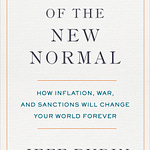How do you regulate the Internet? It’s a question that the federal government in Canada is in the process of trying to answer. But its approach is generating controversy, with several bills raising concerns around freedom of expression.
Bill C-11, the Online Streaming Act, was recently rushed through the House of Commons in a remarkable manner that led one Conservative MP to call it an “affront to democracy.” And my guest on the podcast today says a subsequent ruling from the CRTC — the Canadian Radio-television and Telecommunications Commission — on a CBC/Radio-Canada segment is a “freedom of expression wake up call.”
Michael Geist is a law professor at the University of Ottawa, the Canada Research Chair in Internet and e-Commerce Law, and a member of the Centre for Law, Technology and Society. He’s also a host of the Law Bytes podcast.
NOTE: This podcast was recorded on July 5. Today, the CBC responded to the CRTC ruling, stating, “We simply do not accept the CRTC’s interference in journalism in Canada.” Also, as Michael Geist notes on his blog today, Bill C-11 has now become a trade issue between the United States and Canada.
TH: Michael, welcome to Lean Out.
MG: Thanks so much for having me.
TH: Thank you for coming on. I recently discovered your podcast Law Bytes, and have become a fan. You’ve just published an online essay, titled “The Freedom of Expression Wake Up Call.” This is about Bill C-11, the Online Streaming Act, and the recent CRTC ruling on Radio-Canada. We will get to that. But first, let’s start with a brief explainer for listeners who may be getting up to speed. What is Bill C-11?
MG: Sure. So, Bill C-11, also known as the Online Streaming Act, dates back almost a couple of years, with the government starting from the position that they wanted to bring the large online streaming companies, the Netflix and Disneys of the world, into the Canadian broadcast system. And their goal was really twofold. One was to ensure that there were financial contributions being made by those companies. And also to ensure that there was Canadian content that could be found on those services. Now, I think you can get into a reasonable debate as to whether or not those things are already happening. The reality is those streaming services are some of the biggest investors in film and television production in Canada right now … And [Canadian content] is actually not very hard to find. All you have to do is type in Canada.
But even if we park that to the side, what [the government] did, at least initially, was exclude users or user content from the scope of the legislation. And then along the way, they made a change. They kept the notion of users being outside the bill intact — so individual TikTokers or YouTubers won’t have to show up to Gatineau to appear before the CRTC. But then what they also did was bring their content back into the legislation and said that anything that’s audiovisual is a program that’s subject to potential regulation by the CRTC. And thus, so too the content of individual users. That sparked a lot of concern. That particular bill under the government died with the election last year. They brought it back. The Heritage Minister said that he fixed it, but it turned out he didn’t really. He created an exception to his new exception. So much so that TikTok has concluded that any video with music is subject to the legislation. And so we’ve seen the same kind of concerns come right back again.
TH: The Standing Committee on Canadian Heritage held a hearing on this; you appeared. What were the main points that you made about this bill?
MG: I’ve had a chance to appear now I guess several times, before the Heritage Committee. And then most recently, that bill has passed the House and the Senate started what they call the pre-study. In the fall, there will be more extensive hearings on it. I did appear before the Senate, as well, as part of what they called the pre-study. I tried to focus on at least a couple of things. The first was that I think it is indisputable, for anyone that takes a fair reading of the legislation, that user content is subject to the legislation. There’s been what I think has been a bit of a bait-and-switch, where they say users are excluded. The mantra from the government has been “Platforms In, Users Out.” It’s very deceptive. The reality is that users’ content is still within the legislation. And if you offload the regulation on to the platforms, it’s still users’ content in. It’s just the platforms are being asked to regulate it. I wanted to ensure that MPs, and then Senators, understood that.
I also raised concerns about just how over-broad the legislation is. So, if you start from the proposition that any audiovisual content, effectively anywhere in the world, is a program subject to potential regulation by the Canadian regulator, by the CRTC — it’s almost an unlimited scope of regulation by the CRTC. Now, the government and the CRTC would be expected to create some kind of limitations, but we don’t know what those are. There are no requirements built in. So, I essentially argued that the uncertainty associated with the legislation really runs counter to what we hope for when you get into a legislative process. And that it, I think, falls to the Legislature to set some of those conditions. To establish thresholds above which certain companies may be subject to the rules, but making it clear that anybody below those thresholds are out.
Then, the third point that that I’ve tried to raise is that I think that the core policy objectives around this legislation, even the Broadcasting Act more generally … aren’t fit for purpose at this point in time. So, we often hear about the need to support Canadian content. And it’s framed as ensuring that we get Canadian stories produced. Yet, if you take a look at our current CanCon rules, there are actually three different policies in one. It’s about those proverbial Canadian stories. It’s about economic employment, about ensuring Canadians are employed. And it’s about intellectual property, Canadian ownership of IP. The reality is it doesn’t do any of those particularly well. So, it seemed to me that, at a minimum, if you wanted to try to advance those policy objectives, you need to actually ensure that you had the policy objectives well-established before you jumped in with legislation that sort of blows up part of the system — at least with respect to the Internet.
TH: As you say, Bill C-11 is now with the Senate. It was rushed through despite any hard deadline, despite it being 31 years since this legislation was updated. My understanding is that MPs received the amendments hours before the vote and were expected to vote on hundreds of amendments without discussion or questions. Conservative MP Laila Goodridge called this “an affront to democracy.” Your podcast on this was so interesting. I heard the audio of Hedy Fry repeatedly shutting down requests to have the amendments even read before the vote. What is your analysis of this? Why — if you could speculate — do you think this was rushed through in such a manner?
MG: Yeah, that’s a great question. I guess I’d start by saying it was crazy, I thought, for a democratic country. Where there was no deadline, as you just noted. The worst that would happen is this legislation would carry over in the House until the fall. And if the votes are there — it was pretty clear the votes were there — it would pass. There might have been a case to say that it was time to move on to what’s known as clause-by-clause review. That’s where MPs go over the various clauses that are proposed for amendment and there’s an opportunity to discuss them, to ask questions of government officials, to propose sub-amendments, and then to debate those amendments.
But the approach that the government took — and Hedy Fry was really following the direction of the House of Commons. She was following what the government had ordered. Which was they put forward a motion that said, “We’re going to give you one day for clause-by-clause review.” Despite the fact that there were 150, nearly 200 amendments being proposed. And, as you just noted, many of them only were made available to MPs hours before the actual hearing. [The government] said, “Listen, we’ll give you that one day, basically six hours. And if you haven’t completed this by nine o’clock in the evening, you must move directly to simply voting.” So, just amendment number and vote. No reading even of what the amendment is about. No opportunity for debate or questions. No anything other than just vote. And they did that again and again and again. It was craziness. I mean, we still, to this date, don’t know what was voted on, because those amendments are not even public.
TH: That’s astonishing.
MG: It is incredible to see that, especially with no deadline at all. Frankly, it just made no sense at all, other than this notion of some sort of a political win for the Minister to say that he got this through the House. But even that is chump change, really. Because, of course, there’s still going to be the Senate review and the Senate said they’re going to take months in the fall before they bring this to a vote.
I do think, though, that in the aftermath of this being passed through the house, we now have some hints as to why there may have been this urgency. I’m not a big fan of conspiracy theories, but if you take a look at what we saw, literally within a week or two of the House’s vote, you find one that the government had promoted that this was going to benefit to the tune of a billion dollars of new money. Which I think was, frankly, always illusory. But nevertheless, that was what the Minister had stated. Within days of the bill passing in the House, department officials acknowledged that well, actually, that’s an illustrative estimate. It’s not any sort of firm numbers at all.
[Now:] The concern around regulating algorithms, which had come out of this legislation. Suddenly you had the hearing before the Senate, and you had the Chair of the CRTC saying, “Well, we won’t order these companies to change their algorithms specifically, but we will order them to have an outcome that could result in changing the algorithms.” Largely a distinction without a difference.
Then, lastly, we have the CRTC decision, involving Radio-Canada, where the CRTC and the government had insisted that freedom of expression was well protected. The CRTC is subject to the Charter, and yet the CRTC sat on a decision involving speech regulation in which it ignored — and we get into this further — the Charter. It didn’t conduct any sort of Charter analysis, or freedom of expression analysis. And it sat on this decision for a year and a half, since the case originally arose [in 2020]. It was clearly just sitting there waiting until both, I guess, the CBC’s license renewal was completed, and Bill C-11 was actually passed in the House. It feels like when you’ve got those number of things taking place that perhaps it isn’t totally coincidental that the government was in a rush to pass this legislation through the House.
TH: Let’s talk about the CRTC ruling for Radio-Canada, the French division of the CBC. The CBC, I should note, is my former employer. You have called this case a “wake up call.” For people who are not familiar, can you outline the broad strokes of what this case is?
MG: It goes back, as I mentioned, a couple of years now, where there was a radio segment involving a book that uses the N-word in French. And they used the N-word, in full, three times in French, once in English. It’s fairly clear that they gave a fair amount of thought to the fact that they had done that. But nevertheless, they believed that it was true to the book title and the use of the word in that context. There was a complaint filed with the CBC Ombudsman, who found essentially that CBC Radio- Canada had acted appropriately. Under the current system, there was the ability to appeal that to the CRTC. And it sat with the CRTC, as I say, for roughly a year and a half. The CRTC has now put out a decision where the majority — and there are two dissents, that I can come to in a moment — but the majority has come to the conclusion that Radio-Canada did not act appropriately, or at least consistently with the objectives of the Broadcasting Act. They have ordered an apology. They would like Radio-Canada to come up with a strategy, within a month or two, about how they will handle these cases in the future. And I believe the segment is actually still online, and [the CRTC] would like to know what [CBC Radio-Canada] plan to do about it.
There are two dissenting opinions, both of which make the same case. They both say, “Listen, you’ve conducted this analysis and you have not even invoked any sort of Charter analysis, any sort of freedom of expression analysis, which is surely a requirement when what you are engaging in is speech regulation.”
I argue in this post that you referenced that it’s a wake up call. I arrive at that because I think that this is a genuinely tough issue. I’m a white Jewish male. There are things that might be said that I would take great offence to — and would have real trouble with. I’m not expert in this. And so, I don’t know what the best approach is.
But what I do know is that you can’t, as a regulator, decide on whatever approach you take without at least factoring in the expression issues, and the protections that exist under the Charter of Rights and Freedoms. The fact that the CRTC was willing to do that, I think, really should be a wake-up call. The CRTC, under Bill C-11, is going to be granted far greater power. We’re entrusting it not just with this kind of case. But in fact, to extend its powers to Internet speech more broadly. And the response that we’ve got from people like Minister Pablo Rodriguez, and some liberal MPS and other supporters of the bill, has consistently been — first, they say user content is out of the bill. That’s just not true; they’re gaslighting when they say that. But then they say, “Even if you accept that there may be some [user content] that is captured by this, don’t worry, the CRTC is subject to the Charter of Rights, and freedom of expression.”And then along comes the CRTC with a case and they don’t even consider those issues. So, are we really to trust a regulator like the CRTC? When it has now proven that it may involve itself in content regulation cases and not factor in those Charter rights?
TH: That’s such an important question. And this is all taking place in a broader context. Let’s pull back and talk about the climate right now around Internet regulation in this country, which you have covered extensively. Bill C-11 is one of several bills that have raised concerns. There’s also Bill C-18, the Online News Act. And then the vague Online Harms Bill that has been in development. You actually filed an Access to Information request on the government’s online harms consultation. Walk us through what the key takeaways are on what you found there.
MG: Sure. You’re right, there’s a three-part element to what the government has in mind. We just talked about one on the broadcast side. We can come to news if you like. But on the online harms piece, which the government is in the process of rebranding as online safety: You had the then-Heritage Minister, Steven Guilbeault really want to march full speed ahead with new rules that would involve trying to address what he saw as harms online. My understanding is that within the government, there was an attempt to push back some of the ambitions. He, at different points, had talked about harmful content and over time, the government sort of narrowed it to specifically what would be seen as illegal content — hateful content, child endangerment, other sorts of child pornography, content of that nature.
When Guilbeault struggled to effectively communicate what the government had in mind, the government made a decision to hold back on introducing the legislation. And instead, last summer, almost a year ago now, held a consultation on the issue. It actually took place in the middle of the election. So people could be forgiven if they missed it. Because most people might have been either involved in summer things, or thinking about the election campaign. Certainly not about a government consultation that closed four days after they went to vote. So, the timing itself was odd. Even odder was the government’s decision. After the consultation concluded, they said they would not release the actual submissions. It seems to me that if you hold a public consultation, it’s reasonable to say that there should be an expectation from anyone that participates that those submissions will be made public. You’re trying to influence the government. The public should have the right to see what it is that you’re saying. I say that of people from across the spectrum, whether you’re in favour of what the government had in mind, or you were against it. Surely there should be some visibility on that.
The government, instead, created a summary, a “what we heard” report in which they sought to summarize and remove attribution from specific comments they received. As you mentioned, I filed an Access to Information request seeking the actual submissions themselves. And lo and behold, once I got that, over a thousand pages, with lots of different submissions, what I found was that while some of the submissions had already been made available — people made them available on a voluntary basis, and I posted them on my blog — there were many others that were not.
You had, for example, Twitter likening some of the provisions in there to the approaches that are seen in authoritarian regimes, such as China and the like. You had many groups who would likely have been supportive of this legislation — the type of groups that are really concerned with online hate, or other issues where they feel vulnerable online. And yet they, too, were really concerned with what the government had in mind. So, there weren’t the checks and balances that we would expect. There wasn’t the due process.
There were, for example, requirements for mandated takedowns within 24 hours. Well, you can’t possibly have any sort of due process or review in a 24-hour period. There was the prospect of website blocking, where you’d conscript Canada’s Internet providers to block content, where those platforms failed to abide by what the government wanted to see happen. You had all sorts of oversight mechanisms, or new bureaucracy, associated with much of this that raised a lot of concerns.
And so, the government has said that they would go back to the drawing board, at least a little bit. They struck an expert panel that spent the spring reviewing some of these issues. It has now concluded its work. And we can expect some kind of report sometime fairly soon. And we’ll see. The guess is that we’ll see some sort of legislation later this year. But the starting point certainly, I think, was really dangerous in many respects. It really was offside, I think, with the expectations most would have with respect to safeguards and protections for due process.
None of this is to say that there isn’t a role for legislation in dealing with online harms. My own view is that there is a role. And, at a minimum, we need to ensure better accountability from the platforms, and liability for the platforms where they fail to live up to that. And real transparency about what the platforms are doing when it comes to things like content moderation or takedowns, or the range of different activities that they might engage in. But that’s a far cry from what, at least initially, the government seemed to have in mind.
TH: Let’s spend a few moments on the Online News Act. You had such an interesting interview recently with Sue Gardner — former CBCer, Silicon Valley leader, now at McGill’s school of public policy. What are the major issues with this act that you think need reviewing?
MG: We’ll see how this plays out in the fall. It seems to me, this, in some ways, should be the next C-11, in terms of people paying real attention. I think there is real reason for concern. And I guess I would start here by saying: I don’t think anybody has any doubt that there are challenges that the news sector is facing right now. I think we’ve seen a lot of really interesting innovation. Of course, Substacks and podcasts are part of that — when we see really interesting innovation, and new kinds of reporting and new kinds of ways for people to get their voices out. But there’s no doubt that some of the legacy companies have struggled. Now, it seems to me, the government has come up with a number of different policies that have been designed to support the sector. Most notably, with the labour tax credits that they’ve got, which have been, by all accounts, pretty substantial for many news organizations.
But, over the last year or two, the view has emerged that they would like payments from companies like Google and Facebook as well. And while I don’t think anybody is particularly fussed about new payments from Google and Facebook, there are, in my view anyway, a lot of concerns that arise from this legislation. I’ve got plenty. But just to name a couple off the top. One: I think it ironically increases our dependence on these companies, at a time when we are concerned about just how powerful Google and Facebook, and some of the other Internet platforms, are. The idea that suddenly now we would vest in them effectively, whatever it is, 20 percent, 25 percent, or some number, of costs for journalists within news organizations, just on an ongoing basis, without necessarily any sort of accountability about how that even might take place, strikes me as really problematic. I think we need to be finding ways that make us less dependent on these companies, not more.
But beyond that, my biggest concern actually is how the government goes about defining why these companies should pay anything. Now, it seems to me that if Google or Facebook were, let’s say, reproducing full copies of articles, running ads against it, you can make a case that that doesn’t seem very fair. That they ought to be licensing that content and paying for it. But they already do that. And what the government has in mind is something far beyond that. They say that payment should come merely for facilitating access to news. Well, what’s facilitating access to news? The government now acknowledges it is links. So, it’s not copying, it’s simply directing someone on a social media service — saying, “Here’s a good article.” That link is itself seen as facilitating access to news. Search indexes are seen as facilitating access to news. It seems to me that a reasonable read of the legislation is that if somebody runs a search for, I don’t know, newspapers in Edmonton, and they get out of the Google search a list of those news organizations or newspapers — that that listed itself is a compensable activity. Simply identifying that this is who exists, sending them to the front page, that alone is seen as facilitating access to news and it’s compensable. That just can’t be. There is no value there. I think there’s a good debate that actually the links are of value to the party being linked to. That the platforms are actually benefiting the news organizations by sending traffic their way.
But even if we set that aside, this very expansive view of where there ought to be compensation, I think, is really troubling. I don’t think it’s based on a rational policy. It feels more like a shakedown. But I also worry that if we start by saying the news organization should get this, what makes them so special? What is to stop someone down the road from saying, “Well, you’re linking to my content,” or, “You’ve included my content in your search index, I think you ought to pay for that too.” And so suddenly we find ourselves potentially in a world where there are mandated payments for basically trying to facilitate the free flow of information — for making it easier for people to access information online, or to ensure that their voices are heard. That strikes me as enormously problematic. Going well beyond the particular problem that’s been identified, in terms of trying to find some support for a sector that has struggled.
TH: And what does it mean to have the state involved on such a granular level, on a day-to-day basis? How do you stop overreach? It seems like a major issue.
MG: You don’t stop overreach. In fact, I would argue the overreach is already there. I find it interesting, there’s been efforts to talk about the lobbying that’s taken place from companies like Google or Facebook around these issues. Without much talk about full page blank pages or advertorials that have been run by the Post Medias and Toronto Stars of the world, in an effort to lobby around this. The efforts that they’ve had to basically devote editorial pages and opinion pages to support for the legislation, and a deep reluctance to criticize the government on it. Indeed, we know that there have been op-eds that have been spiked by some of these companies because they’ve been critical of the government itself. So, no doubt, one of the implications of this when you bring the government — make it so directly involved in the news sector in this way — is that it is going to have this kind of impact.
My view, at this stage, would be that if you are convinced that these companies need to be paying something, beyond paying taxes — and to me, the obvious solution is to make sure they pay their fair share of taxes, and you can allocate that revenue in whatever way you see fit. But even if you say, “I want something more than just that,” it seems to me that you could establish some sort of fund mechanism. Rather than having this direct correlation to payments through negotiated deals with the large players, and invoking, again, the CRTC to sort through all of this, to set standards, to set codes of conduct, to decide who participates and who doesn’t. The CRTC has its fingerprints all over this. Surely a better system would be a third party funding mechanism to actually fund the journalism that we believe ought to be funded and struggle to have funded ... [rather than] get the CRTC involved to make a plethora of decisions, which really does inject the government and its regulator very much directly into the news sector.
TH: So much to think about here. To close, Michael, how concerned are you about the state of freedom of expression in this country right now?
MG: That’s a question I get asked a lot. My view would be that I am certainly concerned, on a number of fronts. I think there’s reason for concern about the platforms facing pressure, or, of their own volition, creating some limitations on freedom of expression. I think there are concerns about the government using some of this legislation to create limitations on freedom of expression as well. Not so much the right to speak. I don’t see C-11 as creating limitations on my right to say whatever I want to say. I do think, however, they have real implications for people’s ability to be heard. That’s an important part of expression as well. If you create legislation, as C-11 does, that allows for the promotion or demotion of certain kinds of content, that really does go to the heart of part of what expression is about — which is the ability to find that audience and ensure that your expression is heard.
And while much of the discussion around C-11 has focused on this notion of discoverability — this idea that we ought to conscript the platforms to ensure that Canadian content is more discoverable — if you take a close look at the legislation, discoverability is actually an example of the power the CRTC has. It is not the sole power that it has. Its power involves the presentation of programs. And we know that programs are all this audiovisual content. So if you’re saying that the CRTC can establish conditions around how this content gets presented, then you are getting into questions around potentially demoting certain kinds of content, and requiring warning labels around content that the regulator might see as problematic or, to use its language, as counter to the objectives of the Broadcasting Act. When you look at that potential eventuality, that I think surely does raise real concerns for freedom of expression in Canada.
This transcript has been edited and condensed.














Share this post